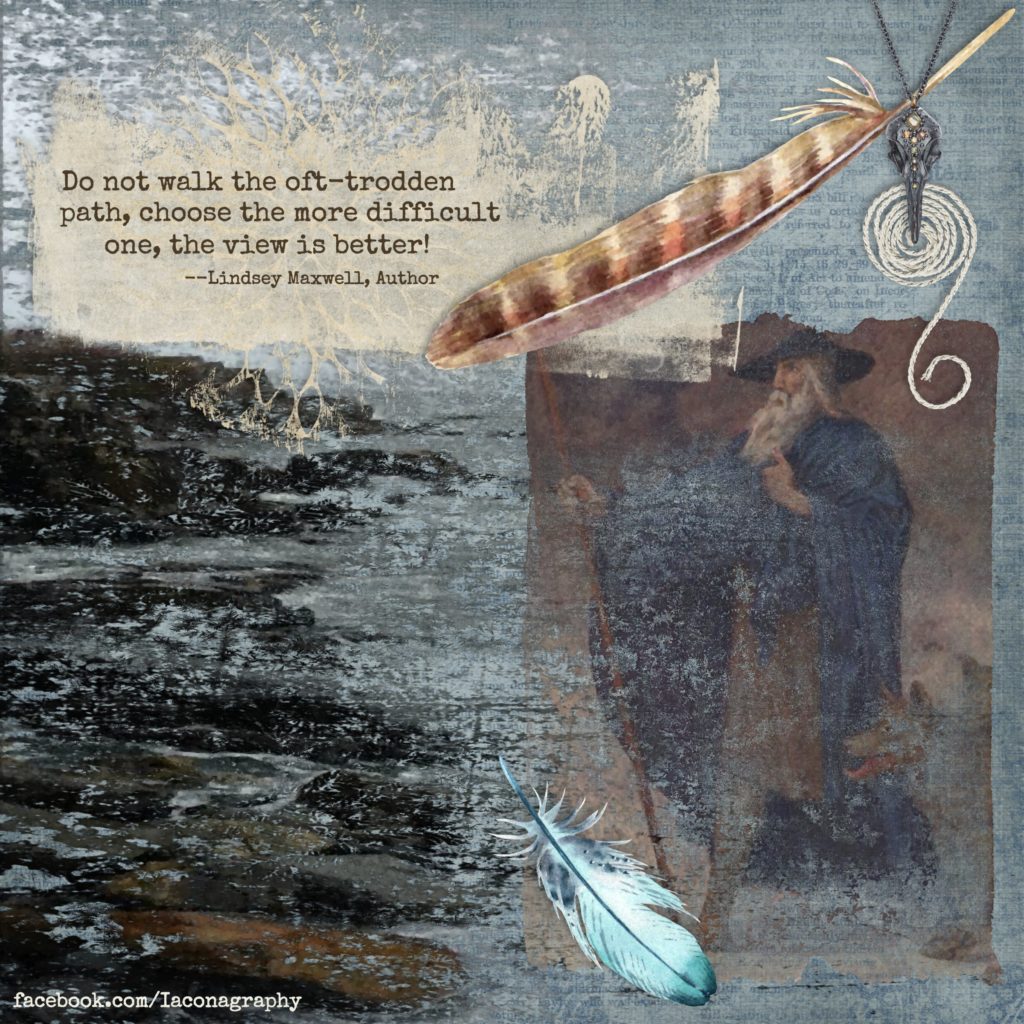Go Where The Wind Takes You….

“Not bound to swear allegiance to any master, wherever the wind takes me I travel as a visitor.
Drop the question what tomorrow may bring, and count as profit every day that Fate allows you.” —Horace, Roman Poet (65-8 BC)
I’ve officially decided to become a Viking. Not in some culturally inappropriate “Brosatru” kind of way, but in the very real sense of what that word actually means. You see, to those uninitiated in Norse Culture, the term Viking has come to mean an entire cultural period and the Norse people who lived during it, when, in fact, it was originally a job title, from the Old Norse vikingr based off of the root word vik (creek, or river). The word could be used as a noun or a verb: as a noun, it meant a person who lived near a bay or harbor who sailed up rivers seeking adventure; as a verb, it meant literally to sail up a river seeking such an adventure. When I say I’ve decided to become a Viking, I don’t mean that I’m preparing to run out and buy myself a seax and the oft-misrepresented horned helmet and take up sailing! No, when I say I’ve decided to become a Viking I mean that I have finally realized that I am a man living by a bay (Boston or Salem, MA; take your pick!) who has decided to live every day, not in the toil of flogging a day-job, but instead sailing upriver towards whatever new adventure awaits!
Ragnar Lodbrok gives excellent advice for the modern would-be Viking in the History Channel show of the same name:
Don’t waste your time looking back; you’re not going that way!
Last week, as I watched my social media numbers slip while I took some much-needed time away to settle things here in “unplugged life land”, a rather catastrophic realization dawned: I have spent most of the past twenty four years looking backwards. Even at times when my afterlife has been its happiest, I have steadily cast a longing eye back on the “life I had before”, whether that backward glance was to remember money, fame, fortune, or the legacy-that-only-halfway-was. Meanwhile, I’ve been gifted, literally against all odds, with the second chance at life that I have right now, right here, today. Now, if that seems stupid to you–maybe even a little bit selfish–let me be the idiot who tells you you’re not wrong! Those backward glances have only gotten more frequent, as I have attempted to whip Iaconagraphy into shape as an actual business. With every single newsletter unsubscribe, every single newsletter unsubscriber who labels us as spam without ever even opening the damn email in the first place, every item that never sells, and the daily lack of any Patreon subscribers whatsoever, I look backwards, and contemplate how things might be different if I was still the me that I was before. But I’m not that me, and I can never be that me again, and honestly, I don’t want to be him again. I like the me I am right now, right here, today.
Looking backwards is just a waste of time and energy. So, why have I continued to do it? Well, there is, of course, that old saying: “Hindsight is 20/20“. But is it, really? For it to really be 20/20 (crystal clear; a perfect vision), it would have to not be tainted by our own perceptions. It would have to not be colored by our own baggage. And face it: neither of those two things is ever the case with us humans. As we go through life, very few of us “pack light”. Instead, we build up perceptions, and memories (both true and false) of how things once were, and amass more baggage than Rose in the movie Titanic! And then we look backwards while life is screaming “Iceberg! Right ahead!”, and wonder why we keep hitting the damn thing!
A Viking doesn’t do that; a Viking “packs light”. You cannot sail to the points on the map where it says “Here Be Dragons” while continually looking backwards. If you do, you will summarily be eaten by said dragons! I’m sure your average, every day real Viking had plenty of regrets, memories, and mental baggage, just like the rest of us humans, but the overriding and very real to them concepts of the Norns, Orlog, and Wyrd kept them looking forward, instead of backwards. In the mindset of the pre-Christian Norsemen, the past, present, and future were “ruled over” by the Norns: Urd (“What Once Was”), Verdandi (“What Is Coming Into Being”), and Skuld (“What Shall Be”). Now, their understanding of past, present, and future was not fixed in a linear conception of time like ours; instead, they held a cyclical view of time that included things that had already happened (and, therefore, could not be changed), things that are happening (which can change “on the fly”, as it were), and things that needed to happen (which might change or might not, depending on a combination of past, present, and what we moderns might call “fate”). Don’t get me wrong here: the past was definitely important to the pre-Christian Norsemen. Urd (“What Once Was”) served to define who they were in the present moment, and nothing and no one could change that definition, which was based on past actions, past occurrences, past battles, both won and lost (on the battlefield as well as in life). But they understood wholeheartedly that the past could not be changed, so why focus on continually looking backwards and fondly wishing for a change that could never come? Urd was (and still is) Orlog: the layers of that which has become, and those layers are set in stone. Orlog cannot be changed anymore than the modern laws of physics. Wyrd, however, can change. Paul Bauschatz explains in The Well and The Tree: World and Time in Early Germanic Culture that wyrd “governs the working out of the past into the present (or, more accurately, the working in of the present into the past)”. In other words, the past doesn’t just influence the present, as we understand things within our modern concept of linear time, the present can also influence the past. Since the very definition of insanity is to do the same thing over and over again, while expecting a different result, it therefore makes zero sense to constantly focus on the things that cannot change–by looking backwards, into the past–but much more sense to focus on what can change–by looking at now and looking forwards, into the future.
That does not mean worrying about the future, however! It doesn’t take a rocket scientist to figure out the difference between the expressions “I dread (fill in the blank)” versus “I am looking forward to (fill in the blank)” , but just in case you need a little extra help with those two concepts, here are their definitions:
dread: anticipate with great anticipation and fear; a strong feeling of fear about something that will or might happen.
look forward to: anticipate eagerly; to expect something with pleasure
Looking forward means going forth in life with exuberant curiosity about what might lay around the next proverbial curve of the river or bend in the proverbial road, as did the Vikings (the “job description”, not the culture, remember!). The Havamal, the “sayings of the High One” (i.e., Odin All-Father) given to us in the Codex Regius (13th century AD) has this to say about worrying vs. looking forward to:
The witless man is awake all night,
Thinking of many things;
Care-worn he is when the morning comes,
And his woe is just as it was. –Stanza 23
In other words: worrying is stupid (“the witless man”) and a waste of energy that only makes you tired (“care-worn he is when morning comes”), and accomplishes nothing else (“and his woe is just as it was”). Instead of lying around dreading what’s ahead, or even looking backwards at what’s come before, we should be actively participating in our present, in order to shape our future:
Cattle die, and kinsmen die,
And so one dies one’s self;
But a noble name will never die,
If good renown one gets.Cattle die, and kinsmen die,
And so one dies one’s self;
One thing now that never dies,
The fame of a dead man’s deeds.–Havamal, Stanzas 77 and 78
Orlog is fixed, that much we’ve already established. Up til now, however, we’ve focused on how that relates to the past. It also relates to the future: it is certain and unchangable that every man will die. (Take it from somebody who knows that a little too well!) It is what happens between those two fixed points (or, in my case, even after the latter) that matters! In order to gain a noble name, one must get renown, which requires active participation–getting out there and viking in the verb sense of the term. In order to be remembered for one’s “famous deeds”, those deeds actually require doing! Over time (and, I’ll confess, in a lot of ways, I am still learning this), I have come to finally understand that the point of death is not when your physical heart stops beating; it’s when you stop doing things in this world. When you are no longer actively participating in life, whether through constantly looking backwards, or through worrying about forwards, then you are truly dead, whether you’re clinically alive or not.
Choosing to live your life in such a way that you “go where the wind takes you” is clearly not for the faint of heart, but the terms Viking and bravery have become nearly synonymous with one another in our modern world for a reason. The actual maps of our world may no longer be emblazoned with the words “Here Be Dragons” in many places, but the maps of our lives most definitely are! We can risk being eaten by said dragons, by losing focus in looking backwards at a past we cannot change or wasting our time worrying about forwards, or we can choose to loose the sails of the present and actively participate in battling those dragons (and fjording those streams!), like Sigurd battling Fafnir in the Volsunga Saga. I choose the latter.
I’ve decided to become a Viking. I’m not wasting my time looking back anymore; I’m not going that way. Nor am I going to continue to lie awake at night, like the witless man in the Havamal, worrying about forwards. I am a man living between two harbors–Salem and Boston–who is striking forth daily on an adventure: the adventure of life! And I will sail upriver bravely, no matter how strong the current; I will viking (the verb) every day, no matter the strain, or the pain. Because if there are deeds to be remembered, first I must do them; if there is renown to be gotten, first I must get it. So long as we’re all still doing–still actively participating in life–we’re not dead yet, and it is high time I stopped living like a ghost, and sailed forward as the man that I am.

